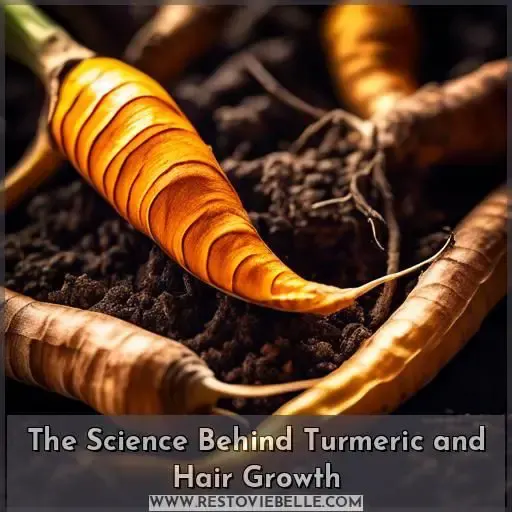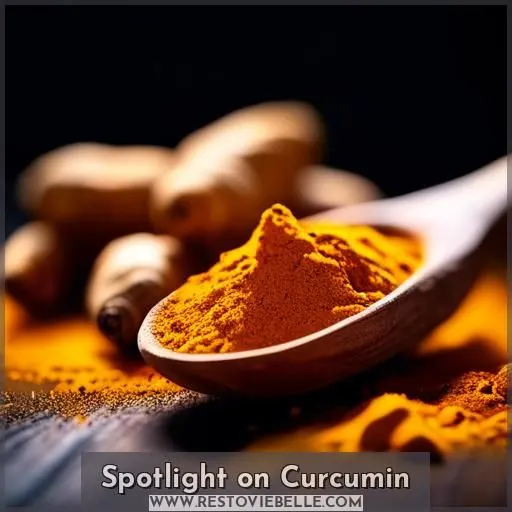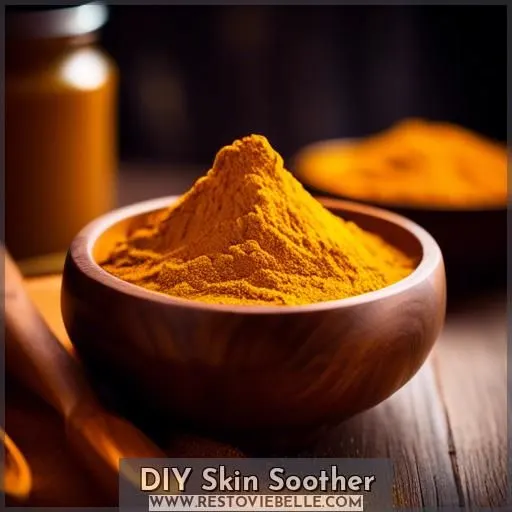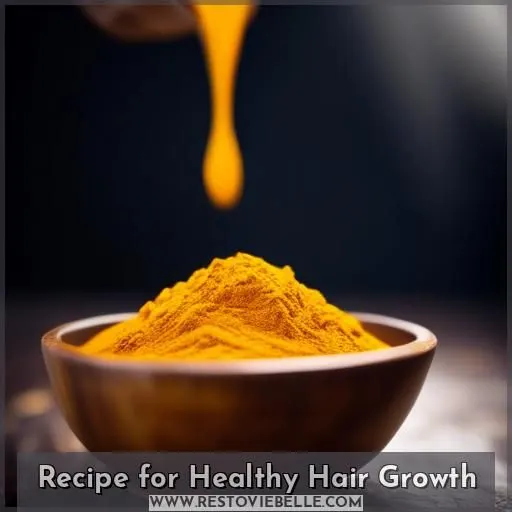This site is supported by our readers. We may earn a commission, at no cost to you, if you purchase through links.

Turmeric, a spice known for its healing properties, can also boost hair growth. It has antibacterial and anti-inflammatory properties, which can help resolve seborrheic dermatitis and fight bacteria and inflammation. Turmeric‘s antioxidant properties protect your hair from environmental stressors, while its ability to activate Vitamin D receptors in hair follicles can stimulate hair growth and extend the anagen phase.
Curcumin, the active ingredient in turmeric, addresses free radicals, increases the anagen phase, and suppresses abnormal androgen receptor expression, potentially treating scalp psoriasis and hair loss. Incorporating turmeric into your diet and hair care routine can deliver nutrients to hair follicles, combat inflammation, and promote healthy hair growth. You can add turmeric to your meals, use supplements, combine it with a high-fat meal, apply turmeric shampoo, or use it as a complement to medication.
By exploring turmeric’s impact on hair growth, you’ll discover its potential for healthy, vibrant locks.
Table Of Contents
- Key Takeaways
- Turmeric’s Healing Properties
- The Science Behind Turmeric and Hair Growth
- Spotlight on Curcumin
- Spice Things Up in Your Wellness Routine
- DIY Skin Soother
- Recipe for Healthy Hair Growth
- Incorporating Turmeric Into Your Diet and Hair Care Routine
- Frequently Asked Questions (FAQs)
- How does turmeric promote hair growth?
- What are the main benefits of using turmeric for hair care?
- How does curcumin, the active ingredient in turmeric, help with hair loss?
- Are there any side effects or precautions to consider when using turmeric for hair growth?
- How can I incorporate turmeric into my hair care routine?
- Conclusion
Key Takeaways
- Turmeric can boost hair growth due to its antibacterial, anti-inflammatory, and antioxidant properties.
- Curcumin, the active ingredient in turmeric, addresses free radicals, increases the anagen phase, and suppresses abnormal androgen receptor expression, potentially treating scalp psoriasis and hair loss.
- Turmeric can be incorporated into your diet and hair care routine through various methods, including adding it to meals, using supplements, applying turmeric shampoo, or using it as a complement to medication.
- Curcumin has notable health benefits that extend to hair health, including addressing free radicals, increasing the anagen phase, and suppressing abnormal androgen receptor expression, contributing to hair growth control and potentially treating scalp psoriasis and hair loss.
Turmeric’s Healing Properties
Turmeric is a spice with a wide range of healing properties. It has been shown to reduce bacterial growth, making it an effective antibacterial agent. Its anti-inflammatory properties can help soothe inflammation and pain.
Turmeric also has antioxidant properties, which can neutralize free radicals and protect cells from damage. These properties make turmeric a valuable tool for promoting scalp health and potentially contributing to hair growth.
The Science Behind Turmeric and Hair Growth
Turmeric has been found to have a significant effect on hair growth due to its antioxidant and anti-inflammatory properties. Studies have shown that turmeric can help resolve the effects of seborrheic dermatitis, a skin condition that may cause temporary hair shedding.
Additionally, turmeric can activate the Vitamin D receptors genes in hair follicles, which may help in hair loss prevention. Turmeric’s anti-bacterial and anti-inflammation properties also help fight bacteria and inflammation, which can contribute to hair loss.
Turmeric’s Effect on Hair Growth
Turmeric’s healing properties extend to hair growth. This spice has been shown to stimulate hair growth by increasing the length of the anagen phase of hair. Additionally, highly concentrated proteins from turmeric root can deliver IGF-1 and miRNA to the dermal papilla, promoting hair growth. Turmeric’s anti-inflammatory and antioxidant properties can help combat scalp inflammation and protect hair from environmental stressors. Here are four ways turmeric can support healthy hair growth:
- Increases anagen phase: Turmeric may increase the length of the anagen phase, promoting hair growth.
- Delivers nutrients: Concentrated proteins from turmeric root can deliver IGF-1 and miRNA to the dermal papilla, nourishing hair follicles.
- Combats inflammation: Turmeric’s anti-inflammatory properties can help reduce scalp inflammation, which can hinder hair growth.
- Protects from stressors: Turmeric’s antioxidant properties can protect hair from environmental stressors, contributing to healthy hair growth.
The Role of Curcumin in Hair Health
Curcumin, the main bioactive compound in turmeric, has notable health benefits that extend to hair health. Its antioxidant properties can effectively address free radicals that can damage skin and hair, promoting healthy cells. Curcumin‘s anti-inflammatory properties may increase the length of the anagen (growth) phase of hair. Additionally, curcumin may suppress abnormal androgen receptor (AR) expression, contributing to hair growth control. It can also decrease high levels of DHT, which can lead to male pattern baldness.
Curcumin has been explored as a potential treatment for scalp psoriasis and hair loss. Incorporating curcumin into your wellness routine can be done through a variety of methods, such as using curcumin-based hair serums or foams, or adding turmeric to your meals.
Spotlight on Curcumin
Curcumin, the main bioactive compound in turmeric, has notable health benefits that may be helpful in addressing hair loss issues and improving damaged hair. It may suppress abnormal androgen receptor expression, contributing to hair growth control, and decrease high levels of DHT, which can lead to male pattern baldness.
Other Hair Benefits of Curcumin
Curcuminoids, the naturally occurring polyphenol compounds derived from turmeric extracts, are abundant in antioxidants that effectively combat free radicals capable of damaging skin and hair. These antioxidants play a significant role in stimulating hair growth by prolonging the anagen phase, the active growth phase of hair.
Curcumin also aids in suppressing abnormal androgen receptor (AR) expression, contributing to hair growth regulation. Additionally, curcuminoids may decrease elevated levels of DHT, which can cause male pattern baldness.
Turmeric can also be employed to address dandruff, and its benefits may differ depending on hair type. Moreover, curcumin may enhance blood flow to the scalp, making it a potential candidate for a scalp massager.
As a skin soother, turmeric can help alleviate scalp problems and promote overall hair health.
Curcumin as a DHT Blocker
Curcumin, the primary bioactive component in turmeric, has been discovered to be effective in combating hair loss concerns. It may inhibit aberrant androgen receptor (AR) expression, contributing to hair growth regulation. Furthermore, curcuminoids, natural polyphenol compounds derived from turmeric extracts, can reduce elevated levels of DHT, which can lead to male pattern baldness. This makes curcumin a promising ingredient for hair care products.
For example, GRO Lash & Brow Serums and the GRO Discovery Kit utilize curcumin to promote fuller-looking lashes and brows. You can also create a turmeric skin care paste or incorporate it into a DIY face mask for complexion perfection. Adding coconut milk to the paste may enhance its efficacy.
Spice Things Up in Your Wellness Routine
Spice Things Up in Your Wellness Routine: You Are What You Eat
To maximize your hair growth, it’s crucial to contemplate your diet. By adding turmeric to your meals, you can facilitate healthy hair growth. Turmeric’s anti-inflammatory and antioxidant qualities can aid in reducing inflammation and neutralizing free radicals, which can contribute to hair loss. In addition, turmeric may extend the length of the anagen phase of hair, promoting hair growth.
You Are What You Eat
Turmeric is a versatile spice that can be added to various dishes, teas, and even supplements to enhance its health benefits. Consuming turmeric regularly can have numerous advantages, including reducing inflammation, boosting immunity, and potentially addressing hair loss issues. However, it’s important to be aware of its nutritional value, consumption frequency, and potential side effects.
To maximize the benefits of turmeric, consider incorporating it into your daily meals. You can add it to curries, stews, or even use it as a seasoning for your favorite dishes. Additionally, turmeric can be used in teas, which can be consumed daily. Remember to pair turmeric with black pepper to improve its bioavailability and absorption.
It’s also worth noting that turmeric can have side effects, such as digestive problems, contact dermatitis, or urticaria. If you experience any adverse reactions, discontinue its use. Turmeric is also a powerful natural dye and can stain clothing, so be cautious when using it in your cooking.
In terms of allergies, turmeric is generally safe for most people, but it’s vital to be aware of any individual sensitivities or allergies to plants of the Curcuma genus. Consult with a healthcare professional if you have concerns about incorporating turmeric into your diet.
When choosing turmeric products, opt for organic and high-quality options to ensure the best results. Remember, turmeric isn’t a replacement for medical treatments but can be a beneficial addition to your wellness routine.
Lashes and Brows That Wow
Explore the realm of turmeric and its influence on hair growth with these curated tips:
- DIY Emollient Paste: Craft a skincare paste with turmeric powder, coconut milk, and honey to alleviate various skin concerns such as redness or inflammation. Remember to consult your dermatologist beforehand if you have delicate skin or concerns.
- Formula for Robust Hair Growth: Integrate turmeric into your diet or hair care regimen to promote overall well-being. For hair-centric benefits, consider incorporating VEGAMOUR’s turmeric-infused products into your hair growth routine.
- Incorporating Turmeric Into Your Diet and Hair Care Regimen: Infuse your meals with turmeric, utilize supplements, ingest it with a high-fat meal, or employ turmeric shampoo to derive its benefits.
DIY Skin Soother
If you’re dealing with skin issues, a turmeric paste can be a natural remedy. Mix turmeric with water to create a paste, then apply it to your skin. Let it sit for 15-20 minutes before rinsing it off. The curcumin in turmeric has anti-inflammatory and antioxidant properties, helping to soothe irritation and reduce the appearance of blemishes. Plus, it’s a gentle exfoliant, removing dead skin cells for a smoother complexion. Try it out and see the difference for yourself!
| Step | Description |
|---|---|
| 1 | Mix turmeric with water to create a paste |
| 2 | Apply the paste to your skin |
| 3 | Let it sit for 15-20 minutes |
| 4 | Rinse it off |
Recipe for Healthy Hair Growth
To boost hair growth, consider incorporating turmeric extract into your routine. This natural ingredient can help thicken hair by promoting hair follicle health. By using turmeric extract, you can potentially increase the rate at which your hair grows, leading to improved overall hair health.
To maximize its benefits, consider adding turmeric to your shampoo or using it as a hair mask. Remember, turmeric’s healing properties extend beyond hair growth, making it a versatile addition to your wellness routine.
Incorporating Turmeric Into Your Diet and Hair Care Routine
Incorporating turmeric into your diet and hair care routine can be a game-changer for promoting healthy hair growth. By adding turmeric to your meals, using supplements, combining it with a high-fat meal, applying turmeric shampoo, and understanding its role as a complement rather than a replacement for medication, you’re taking a science-backed, practical approach to enhancing your hair’s health.
Adding Turmeric to Your Meals
Turmeric is a versatile spice that can be easily incorporated into your daily meals. Here are three ways to add turmeric to your diet:
- Cooking with Turmeric: Turmeric is commonly used in various dishes, including curries, stews, and rice dishes. Sprinkle a pinch of turmeric into your favorite recipes to enhance their flavor and add health benefits.
- Turmeric Tea: Brew a warm cup of turmeric tea by mixing turmeric powder with hot water and adding honey or lemon for taste. This is a great way to start your day with a boost of antioxidants and anti-inflammatory properties.
- Turmeric Smoothies: Blend turmeric into your favorite smoothie recipes. Combine turmeric with fruits like bananas or berries, a handful of nuts, and a dash of black pepper for an extra boost in bioavailability.
Using Turmeric Supplements
Using turmeric supplements can be an easy way to integrate this effective spice into your diet and hair care routine. However, it’s crucial to evaluate potential side effects, safety considerations, dosage recommendations, and potential interactions. Long-term effects and the significance of supplementation in general hair health should also be evaluated.
Combining Turmeric With a High-Fat Meal
To enhance the absorption and bioavailability of turmeric, consider combining it with a high-fat meal. Here are some tips on how to do so:
- Eat with a high-fat meal: Turmeric is fat-soluble, which means it dissolves in fats. Consuming turmeric with a meal that contains healthy fats, such as avocado, olive oil, or coconut oil, can help increase its absorption and bioavailability.
- Add pepper: Piperine, a compound found in black pepper, can boost curcumin absorption by up to 2,000%. Adding a pinch of black pepper to your meal can help enhance the absorption of turmeric.
- Use a high-fat supplement: If you’re taking a turmeric supplement, look for one that contains healthy fats or piperine to improve absorption.
- Cook with healthy fats: When cooking with turmeric, use healthy fats like olive oil or coconut oil to help increase its absorption.
- Pair with quercetin-rich foods: Quercetin, a plant pigment found in foods like apples, berries, red grapes, and onions, can inhibit the enzyme that inactivates curcumin, increasing its absorbability.
Using Turmeric Shampoo
Embark on the radiant odyssey of turmeric shampoo’s efficacy. When selecting a shampoo, meticulously examine the ingredient roster for this precious spice, guaranteeing not only the removal of impurities but also the enhancement of scalp vitality and the prevention of hair loss.
Avoiding Turmeric as a Replacement for Medication
Regarding hair growth, turmeric can be a valuable asset to your wellness routine. However, it’s imperative to remember that turmeric isn’t a substitute for medication, especially when addressing hair loss concerns. Here are three key points to consider:
- Turmeric isn’t a panacea: While turmeric has been shown to have potential benefits for hair growth, it isn’t a replacement for medical treatments. Hair loss can be caused by various factors, including genetics, hormonal imbalances, and medical conditions. If you’re experiencing hair loss, it’s vital to consult a healthcare professional to determine the underlying cause and appropriate treatment.
- Turmeric may aid in hair growth: Turmeric contains curcumin, a compound that has been shown to block the production of dihydrotestosterone (DHT), a hormone linked to hair loss. Additionally, curcumin may help increase blood flow to the scalp, which can promote hair growth. However, these benefits shouldn’t be relied upon solely for hair loss treatment.
- Turmeric should be used in conjunction with other treatments: Incorporating turmeric into your diet or hair care routine can be a beneficial complement to other hair loss treatments, such as minoxidil or finasteride. However, these treatments should be used under the guidance of a healthcare professional to guarantee their safety and effectiveness.
Frequently Asked Questions (FAQs)
How does turmeric promote hair growth?
Turmeric promotes hair growth by suppressing abnormal androgen receptor (AR) expression, which contributes to the control of hair growth and is overexpressed in follicles of those experiencing hair loss. Curcumin, the main bioactive compound in turmeric, may help lower testosterone levels and inhibit dihydrotestosterone (DHT) production, which is involved in both prostate growth and in the miniaturization of hair follicles that causes androgenetic alopecia.
Turmeric may also improve blood flow to the scalp, delivering more oxygen and nutrients to the hair follicles, potentially leading to thicker, healthier-looking hair.
What are the main benefits of using turmeric for hair care?
Turmeric is a versatile spice with numerous benefits for hair care. It can:
- Promote hair growth: Turmeric mixed with honey and milk can reduce the negative effects on your hair, potentially increasing hair growth.
- Treat scalp conditions: Turmeric’s anti-inflammatory, antifungal, and antioxidant properties can help soothe various scalp ailments, such as dermatitis and eczema, which can lead to itchy, flaky skin and thinning hair.
- Improve scalp health: By increasing circulation and providing nutrition to hair follicles, turmeric can help stimulate healthy hair growth.
- Reduce hair loss: Turmeric may inhibit the activity of the growth agent beta-one, which can contribute to hair loss.
- Enhance hair appearance: Turmeric can help improve the condition of your hair and scalp, leading to healthier-looking hair.
To get the most out of turmeric for hair care, consider the following tips:
- Combine with other ingredients: Turmeric can be mixed with honey and milk, or added to shampoos and conditioners, to enhance its benefits.
- Use as a mask: Apply a paste made from turmeric and olive oil to your scalp before shampooing, or leave it on overnight for added benefits.
- Pair with fat: Turmeric is more effective when consumed with a source of fat, such as coconut oil or full-fat dairy, to improve its bioavailability.
- Consider supplements: Turmeric supplements can provide additional benefits, especially when taken with a meal that enhances absorption.
How does curcumin, the active ingredient in turmeric, help with hair loss?
Curcumin, the active ingredient in turmeric, helps with hair loss by decreasing high levels of DHT, a primary factor in hormonal hair loss. It can also combat the effects of DHT on hair follicles, promoting hair growth.
Are there any side effects or precautions to consider when using turmeric for hair growth?
Turmeric, a popular spice renowned for its anti-inflammatory attributes, can be harnessed for hair growth. However, there are certain caveats to bear in mind when employing turmeric for hair growth.
Turmeric can trigger digestive ailments, including nausea, diarrhea, and abdominal discomfort, when consumed in excessive amounts. It can also induce contact dermatitis and urticaria (hives) when applied directly to the skin.
Furthermore, turmeric is a potent natural dye and can easily discolor clothing. To mitigate these adverse effects, it’s advisable to use turmeric as directed and to seek medical advice if side effects persist or become severe.
How can I incorporate turmeric into my hair care routine?
Spice up your hair care routine by adding turmeric! Mix it into a DIY mask with coconut oil or honey, or look for turmeric-infused shampoos. Remember, it’s not a magic potion but every bit helps.
Conclusion
Imagine your hair, radiant and abundant, swaying gracefully in the sun’s embrace. This isn’t a mere aspiration; introducing turmeric into your hair care regimen can transform it into a tangible reality.
Turmeric’s curcumin not only alleviates scalp irritation but also engages in a microscopic war against inflammation and free radicals, nurturing an environment conducive to hair growth. By integrating this golden spice into your diet and hair care practices, you’re preparing the foundation for healthier, more robust locks.
Embrace the power of turmeric, and allow your hair to radiate with newfound vitality.













